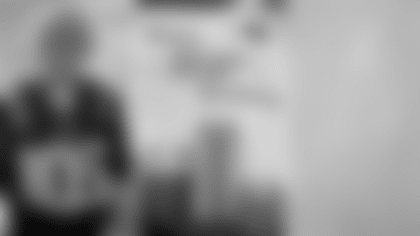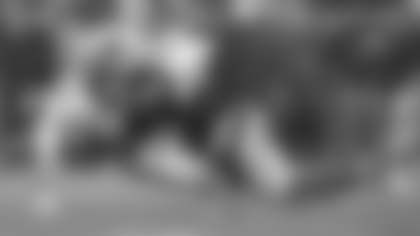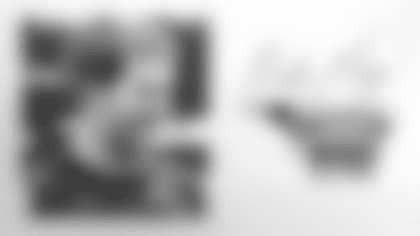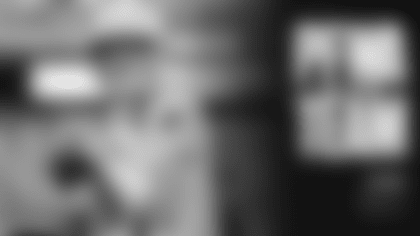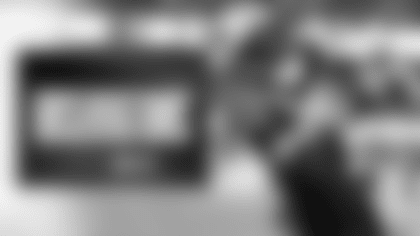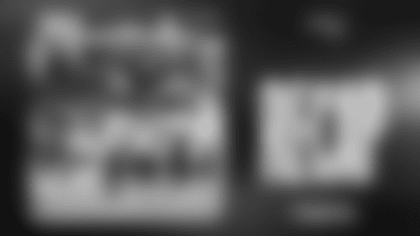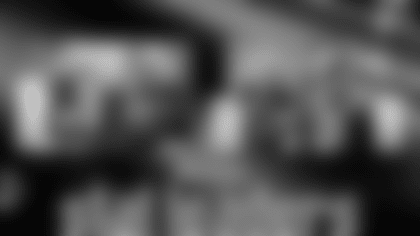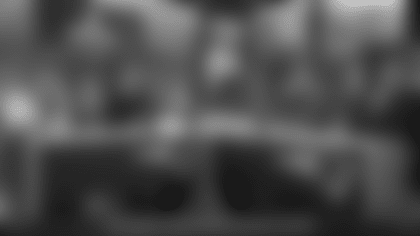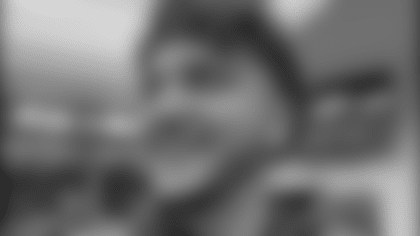[

]()
BB: We don't have any changes on the injury report so were status quo. Just trying to beat the heat. What's up? Come on, it's Jet week. You've go to have something.
Q: Last year your team rose to the occasion in do or die games all the way through the Super Bowl run. Does this team have that same character?
BB: Well, we're going to find out. We're in it now. This is about as do or die as it gets. This week. So we'll find out.
Q: Some of us have characterized last season as having more 'lucky' incidents than this season has for the team. I am wondering if you disagree with that characterization or if you think it's accurate that the ball seems to bounce a little better for you last year than it has so far this season.
BB: That's what you think happened? Is that what you are saying?
Q: No, I am saying … a lot of times when I have a question, when I say some people that doesn't mean that's what I think. I'm just curious what your response to that is.
BB: Well, I'm curious to what you think. Is that what happened?
Q: (Laughter) Alright, yeah I think you had more lucky breaks last season. I'm curious to know what you think.
BB: I don't know. You know I can't really worry about that right now.
Q: I'm just curious.
BB: Well, it's hard for me to reflect back and rate this year to last year. In the end, they are probably going to even out after 28 years, they will probably even out somewhere along the line. What really my focus is on is moving forward. I think that's really … I'll leave it to the experts.
Q: Well, when we find some we'll let you know.
BB: Alright.
Q: After looking at the Titans game, besides the obvious that Eddie George had a pretty big night, what is your assessment of what went wrong with your run defense?
BB: Your losing me, Eddie George?
Q: Eddie George.
BB: (He averaged) 3.3 per carry.
Q: What is your assessment of what went wrong with your run defense?
BB: We gave up a lot of yardage in the running game on sub-runs and to the quarterback especially in the first half to the quarterback. Eddie George averaged 3.3 per carry.
Q: He had over 100 yards, which is the first time he had 100 yards. You gave up 238 yards as a team.
BB: He carried the ball, I don't know, how many times did he carry the ball? 35? I don't know. Whatever it was 34 times. Show me the last back that has carried the ball 34 times that hasn't gained 100 yards. It would be a short list.
Q: You gave up 238 yards as a team.
BB: Right. Eddie George averaged 3.3 per carry. I thought the running defense against him when he carried the ball was pretty good. I mean it's hard to do better than that. I think he average 2.8 at the end of the first half which, you know, I think we'll take that. (The) quarterback had a lot of yards scrambling. (He) had 50 yards in the first half. Most of (Robert) Holcombe's runs came on third down or in sub-type situations. They weren't first down conventional type plays, so they were, you know, big runs against our third down defense, which was bad. The quarterback scrambles were bad and that's where a lot of the yardage came. Then when that yardage came, that enabled Tennessee to stay on the field to get another set of downs and therefore the running back got a lot more carries. They had the ball for 40 minutes in time of possession. Towards the end of the game, they ran the ball pretty much every time like most teams do when they are ahead and that's where a lot of the running yardage piles up like it probably pretty much does every week when a team is ahead by 14, 17 points.
Q: Did you underestimate how healthy (Steve) McNair was or how well he could run? Or did your players underestimate that?
BB: I don't think so. We have a lot of respect for McNair. We respected him in the game plan and in the calls that we made. And we certainly spent a lot of time talking about him and practicing against him. But, hey the guy is a good player. He is a damn good player. And he made some plays better than we made them. We would like to have played him better but we didn't and you've got to give him some credit for doing it too. The guy is good.
Q: Is third and two considered a sub-situation?
BB: It could be. It depends on what they have in the game and how they match up. If they have multiple receivers in the game, then sometimes we put our sub coverage groups in there, whether it's a nickel-dime group, whatever it happens to be.
Q: Where those problems schematic or were they breakdowns?
BB: Well, a combination of both. You know, the percentages in most of those situations are that they are going to throw the ball and teams run it occasionally. But, overall, third down obviously as the yardage gets longer, just gets higher and higher into the 70's, 80's, 90's percentages throughout the league. And that's true with most individual teams; there are some exceptions from time to time. But for the most part that is the way it is. We could have played them better. It's one of those deals too where if you put in your big run stopping defense on third and two and they've got in their multiple receivers, then you're probably looking at them deciding not to run the ball. Part of the matchup with them is to set your sub-defense up against their sub-runs or their one back runs. Against Tennessee, they beat us on a couple of them. No question.
Q: What's the difference between the Jets team you played in week two and the Jets that you are going to face on Sunday?
BB: Oh, just about as big a difference as you can get. First of all on special teams they're probably the most explosive return team in the league with (Santana) Moss and (Chad) Morton, we saw Morton prior to our first game, return a couple of kickoffs against Buffalo. But he's maintained that all through the year. Moss has broken the punts, so they are real explosive there. Defensively, they're not giving up many big plays. They're rushing the passer. They are playing very good run defense. They are tackling well. Their linebackers Mo Lewis and Marvin (Jones) and (Sam) Cowart are active. I think they are getting good play up front especially from (Jason) Fergie (Ferguson). So, defensively they're not giving up many big plays. They're not giving up as many points. They're aren't as many opportunities in the running game and they've complimented that offensively with Curtis (Martin) being healthy and getting a good consistent running game out of him and (Lamont) Jordan. (Laveranues) Coles is having a big year. Moss has stepped in there. (Wayne) Chrebet made plays in the passing game, getting contributions from (Anthony) Becht and Richie Anderson like they usually do. Offensively, I think they are more balanced. They're more consistent. They score more points. Defensively they're playing better. They've got big weapons in the kicking game and they're kicking the ball well too. They're return game is as explosive as any teams in the league. So, (they are) pretty solid all the way through. I think it's, as I said yesterday, a real credit to the team, the coaches, the organization. They got off to a little bit of a slow start there at 2-5 and went out and beat San Diego when San Diego was one of the hot teams in the league and have really kept it going since then. They're playing well. They're playing well in all three areas of the game.
Q: You alluded to their returns. Are you kind of still waiting on that big play from your return guys?
BB: Well, we had one against Oakland. We had one against Detroit. (We) broke one to the kicker last week on a kickoff return. Yeah, you are looking for those home run balls. You are looking to be able to take it to the house. You know, we haven't had very many opportunities in the punt return phase of the game, not as many as we would like to have. A couple of weeks ago that was good against Detroit and Minnesota. We had a couple of games like that that were some turnovers. But we need to create more opportunities for ourselves in that area of the game. I think that it could a strength for us but we just haven't got a lot of solid opportunities in the last week. We only really had one legitimate punt return.
Q: What's going on with Ken Walter? It just seems like he's not hitting them.
BB: I think he has had his moments. Again, a lot of our punts have been plus 50 punts and that's always going to cut into the average and so forth. You're looking for those longer balls when you are backed up, there's no question. He's hit some and some haven't been as good.
Q: Has it been a level of concern at all?
BB: Well, look, practically every area of our team could be better and more consistent than it is and that's one of them. And I don't think that Tennessee was probably his best night, but I don't think it's terrible. I think there has certainly been some positive moments. But it can be more consistent, there's no question.
Q: Have you noticed a difference in field position because of how well he punted last year?
BB: Well, yeah. I think overall our field position has been pretty good. I think we'll be at the top of the league in terms of overall field position. Having said that, it can always be better, and you're always looking to put your offense on a shorter field and your defense on a longer one. It hasn't been terrible. Where we really had problems were in a couple of the games right there in the middle of the season, Chicago, Oakland, Green Bay, where we end up giving the ball up inside our 10 yard line or inside our 15 yard line and those pretty quickly led to points and shifted the way the game was going at that point usually for the worse. That's where you get some real bad filed position swings. But overall our kickoff return field position has been better. Our kickoff coverage has gotten better since the first Buffalo game and it still can be improved.
Q: In terms of looking back at game film and the Jets, do you look at many of the games where (Vinny) Testaverde started or is the scheme that much different with (Chad) Pennington?
BB: No, the scheme is pretty much the same. Pennington has played so many games now, that if you look at the last, I don't know, eight, nine, 10 games, whatever it is, he is there all the time. And those are ones that you look at. I think in the Jets situation, again, Martin is healthy, Pennington is the quarterback, their offense seems to be flowing more smoothly than it did early in the year. The offensive line is in tact. They've played well. They've got all their pieces in place. So, to go back to when different people were playing and maybe they weren't quite as efficient as they are now, I don't think we're going to get that. I think we're going to get the efficiency and the tempo that the offense has been playing at the last two months. So that's really where most of our attention has been.
Q: Is Curtis Martin running like Curtis Martin?
BB: Yeah, Curtis looks good. We all know what Curtis can do. Pound for pound he is as strong as they come. He's got great quickness, he makes people miss in the holes, excellent draw counter-runner/screen guy, you know, he has great change of direction and balance and again, for not being a real big guy, he plays big and he runs strong. So, yeah, he looks good. They had Jordan in there earlier, he hasn't played as much lately. But they have complimented each other and they've used both full backs, (Jerald) Sowell and Anderson in the back-field mostly to block or catch, but from time-to-time to carry the ball. I think that all of their backs, they've had a real productive year out of all of their backs other than Curtis that first month of the season when he had the ankle. He didn't look like he was quite himself.
Q: When you talk about yards per carry some of the bigger backs, whether it was (Jerome) Bettis, Eddie George or Ricky Williams, they haven't had the real big yards-per-carry games. Curtis would probably be more similar to the (LaDainian) Tomlinson's and the (Priest) Holmes'. Is that your take and have you had success at all with the slasher types like Travis Henry in stopping those guys?
BB: Well I think, again, we've talked about the running game a number of times this year. The biggest problem in the running game is when the running game sets the stage for the rest of the game. When a team comes out and runs the ball and builds up a 14 or 17-point lead, that's really obviously a significant problem. When for whatever reason you're down by 14 or 17 points, whether they were turnovers, whether they are kick returns, whether they are giving up plays on defense, whatever they are. And then for the last 20 minutes of the game, the team runs 24 running plays and throws four passes, whatever that yardage amounts to is, to me, not nearly as significant as what lead to that creating the situation.
Q: (On San Diego running the ball even though were behind)
BB: No question. And they ran, right, not only to make it a close game but to get ahead. That was a significant problem and I'm not minimizing that at all. It was bad run defense and we paid for it and it cost us. I'm just saying a lot of the yardage in the Tennessee game came as a result of some key third down conversions, some key third down scrambles, well not just third down but some key scrambles by McNair. Some sub-runs by Holcombe that put them into that situation. Yeah, you can give the ball to whoever you want to give it to at that point.
Q: So despite the fact that San Diego ran for 238 and Tennessee ran for 238, the run defense in your explanation, is not nearly as bad as it was in weeks four, five and six?
BB: Well, it was bad on the quarterback scrambles and it was bad in the sub-runs. Against just the regular first and second down running game it was a lot better against Tennessee than it was against Kansas City and San Diego. Way better. Again, I think we had more trouble with the running game in the first Buffalo game. But because the score eventually (in) that game, got out of hand, how many times did Buffalo run the ball in the second half? I don't know, four, three, whatever it was, it wasn't very many. It took them out of the running game as we've been taken out it, and as any team that falls behind significantly in the second half is going to get taken out of their running game.
Q: Going into this particular game, this one game, how do you feel about your football team? Are you worried? Are you confident? How do you feel right now as we sit and get ready for Sunday night.
BB: Well, I think that were in a position where if we win this game, the following week will be an important week for us and it will decide the division. That's really where we are at. That's the opportunity that's in front of us. I think that we're capable of going out and playing well and winning Sunday and that's what we expect to do and that's what we're working toward. If we do that then that will create a bigger game the following week. And if we don't then we're looking pretty much close to the end of the road then. A lot would have to happen for it to go back in our favor. We understand that, that's the way it is. There's no beating around the bush on this one. We need to probably play our best game of the year and I expect for us to play it. We'll find out Sunday. That's why we'll all be there.
Q: With that said, you've done a lot of different things motivational wise with your team over the last several years. Do you need to do anything this week?
BB: We'll do everything that we can to try to maximize our performance on Sunday. Everything we can do. There's nothing to save it for at this point. This is everything we got. We need to generate everything that we can this week against the Jets and put our best effort out there all the way across the board, coaches, players, everything we got.
Q: In the Tennessee game, did you see anything that motivated you to make any kind of a scheme or personnel change on your run defense?
BB: Well, nothing that we haven't done before. We're not going to revolutionize the game this week. We had breakdowns; we'll correct those breakdowns. Schematically we may move a guy a little bit here or there to try to help address one problems although that will weaken us somewhere else, but that's what you do when you move them around. But nothing that… we're not going to do anything that's going to be dramatically different. We've practiced this for a long time. We've run it, I'm talking about schematically, Romeo (Crennel), myself, Eric (Mangini) going all the way back. I think we know what we need to do and how we need to do it. And we need to do it better than we did it. The emphasis is on doing it better. We're not going to come up with a new defense.
Q: Most of that damage came from sub situations, does it surprise you that it was done against, I guess, guys who you would think would be strong against the run?
BB: Well, I don't think you can pin all those yards or those plays on one player. Again there were several problems on the play throughout the team. It was just one guy. Collectively we need to do a better job obviously than we did. There's no defense design that we have to create the holes and create the yardage that we gave up on those plays. But they were team breakdowns and schematically looking at it, we may need to put a little more emphasis in the running game in that situation, a little less in the passing game because you are playing pass coverages and putting yourself in better pass positions then that puts you in a little bit less of a run position. Some of the situations that we had there, we can improve a little bit based on what we call and where we position them. And we can play it better. It's a collective problem.



